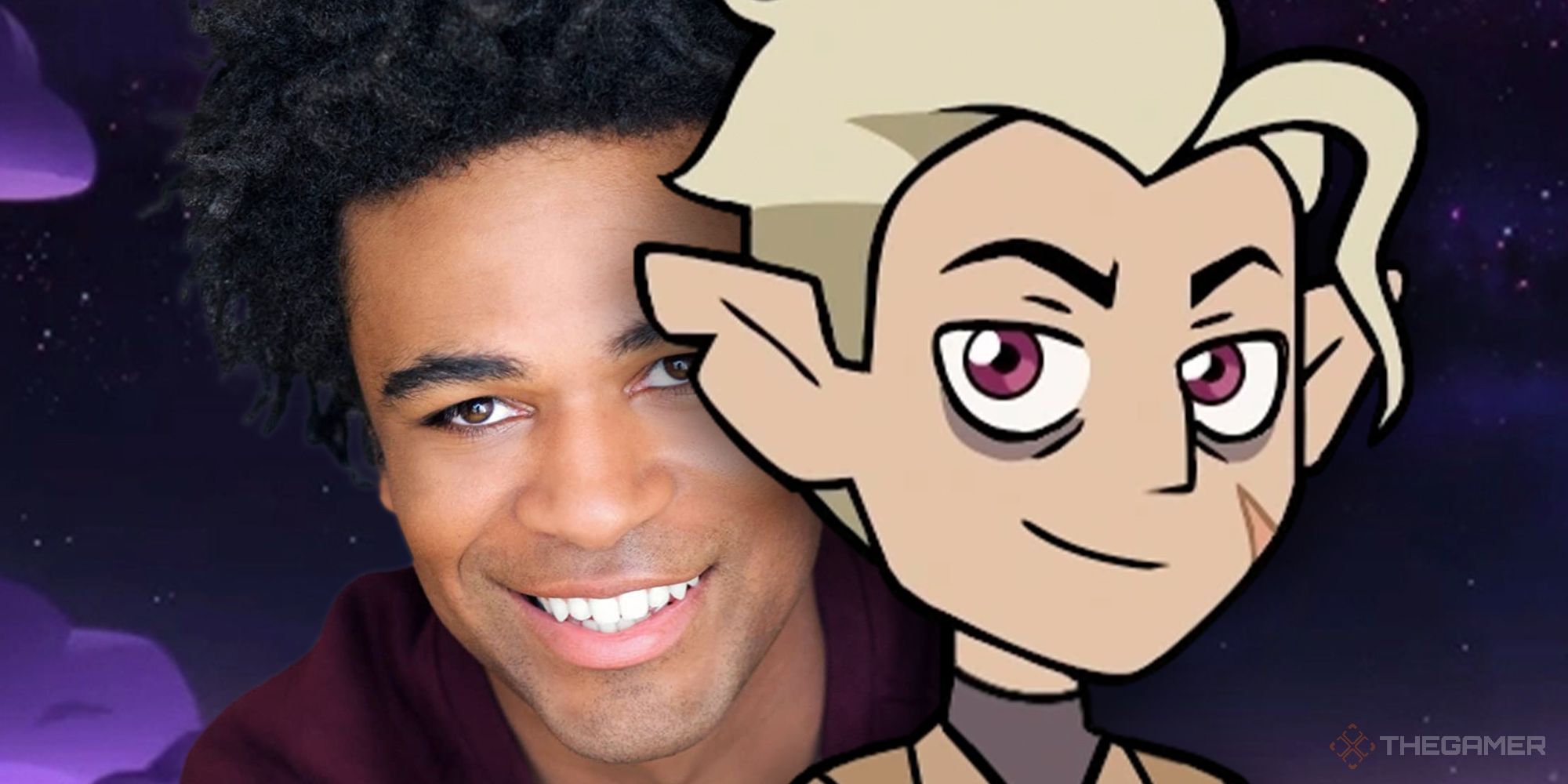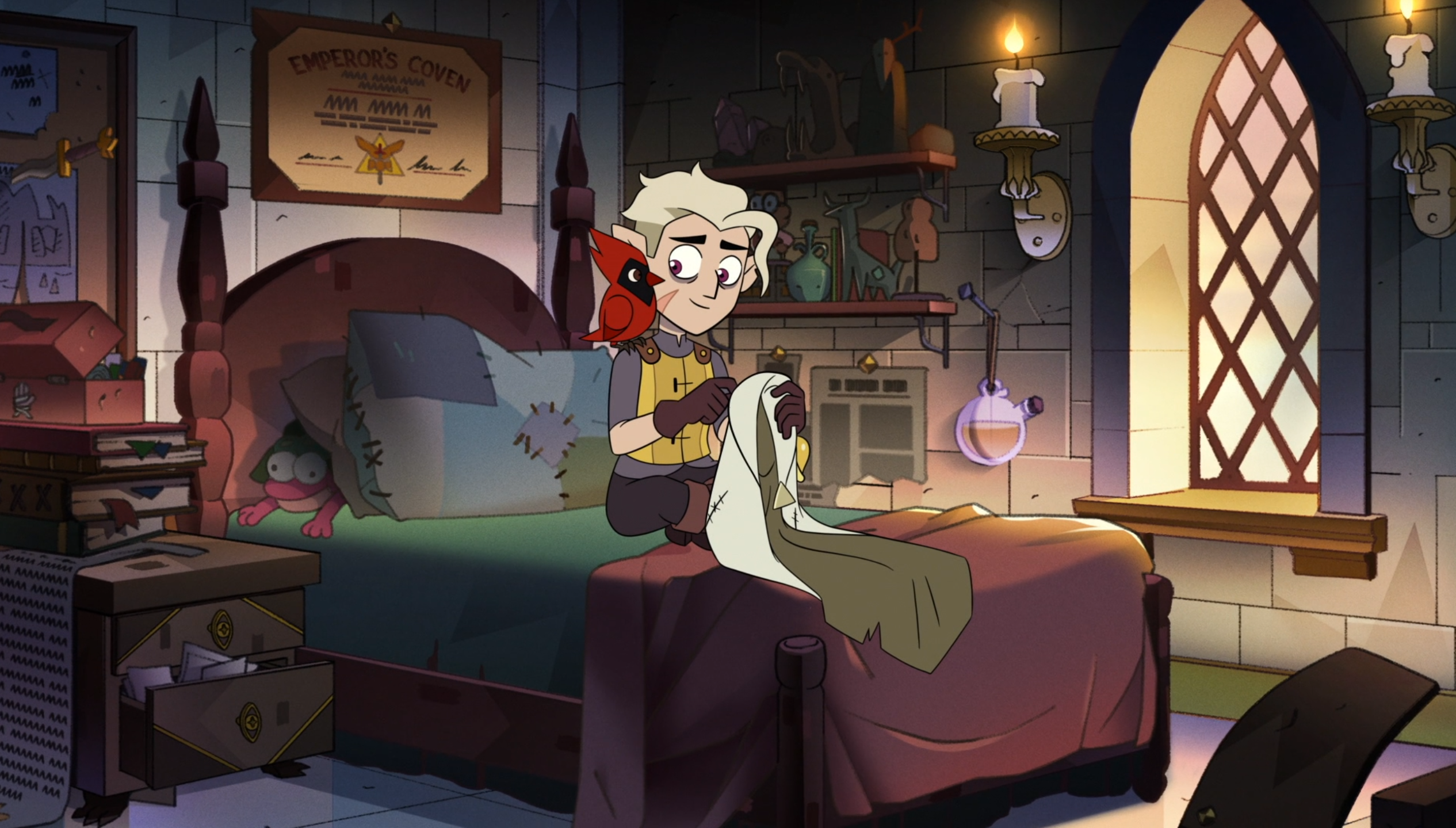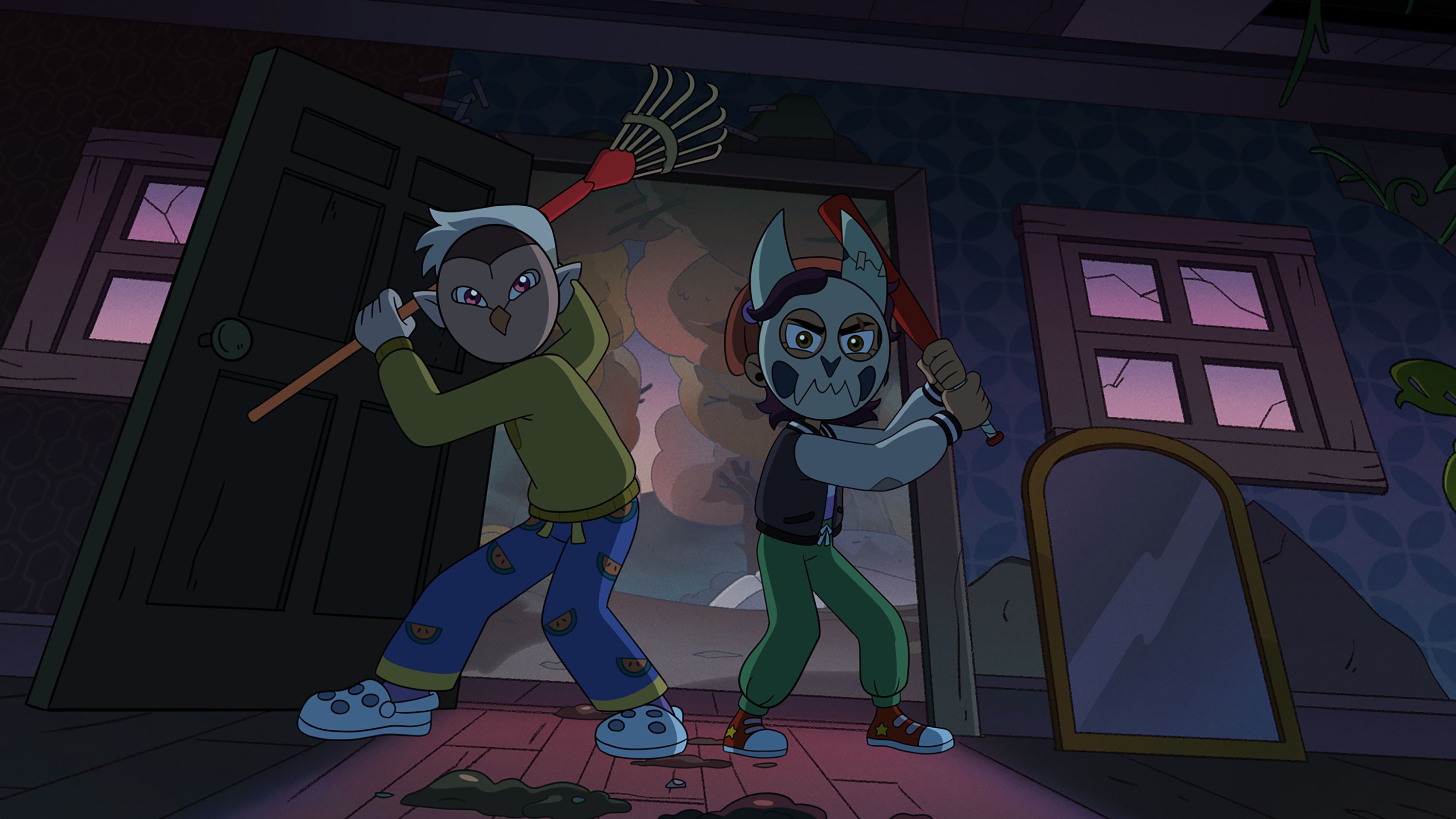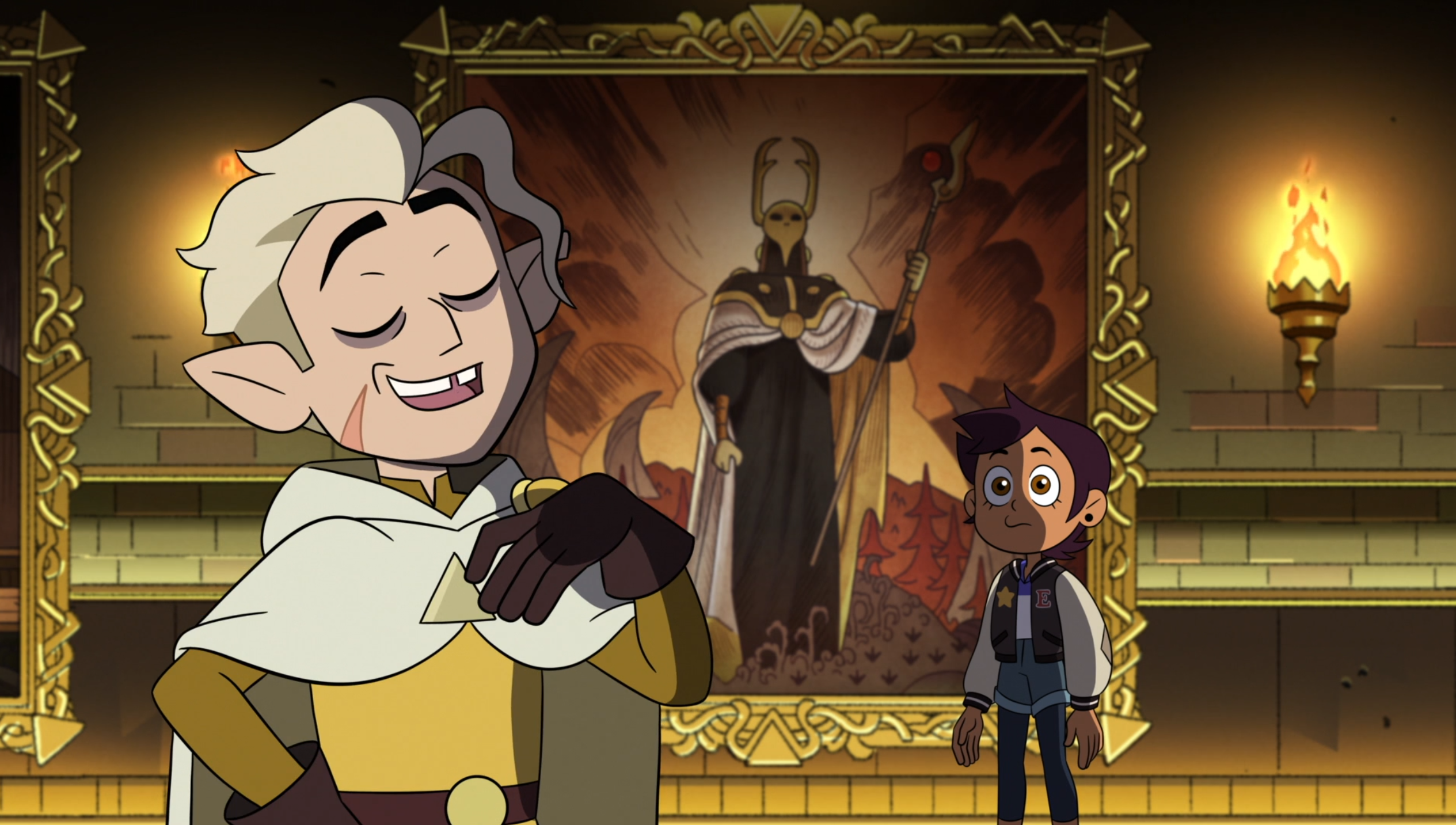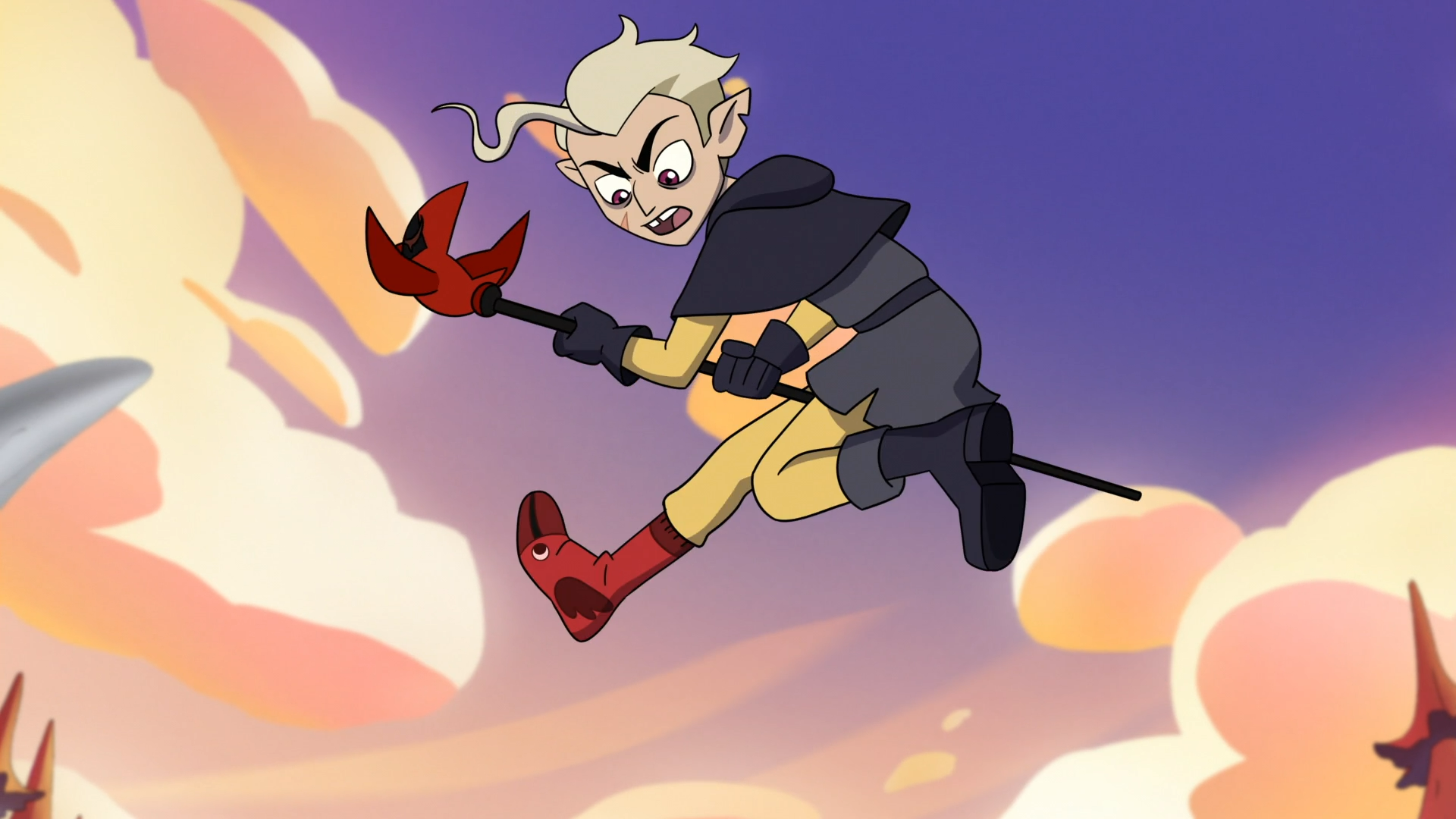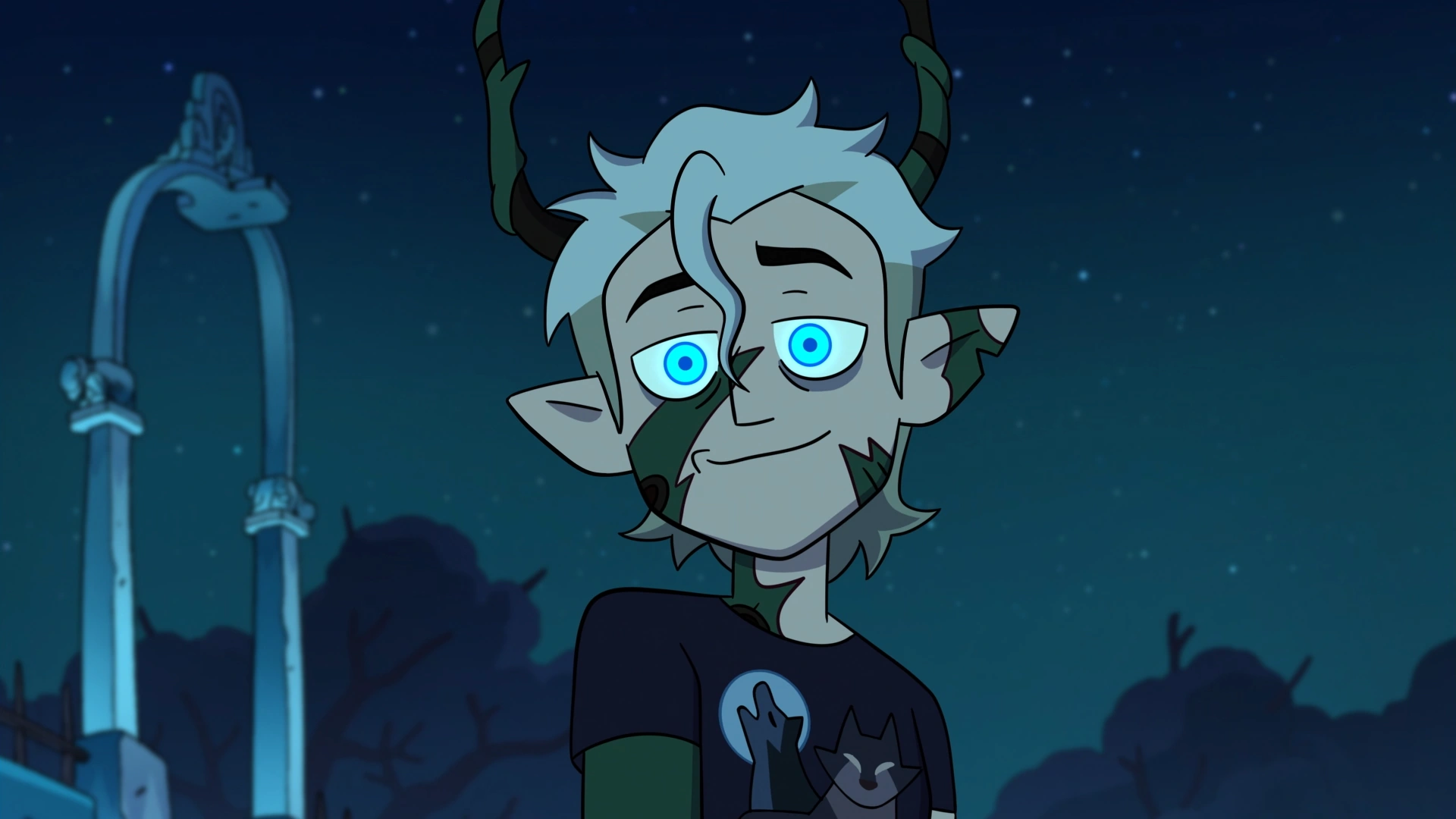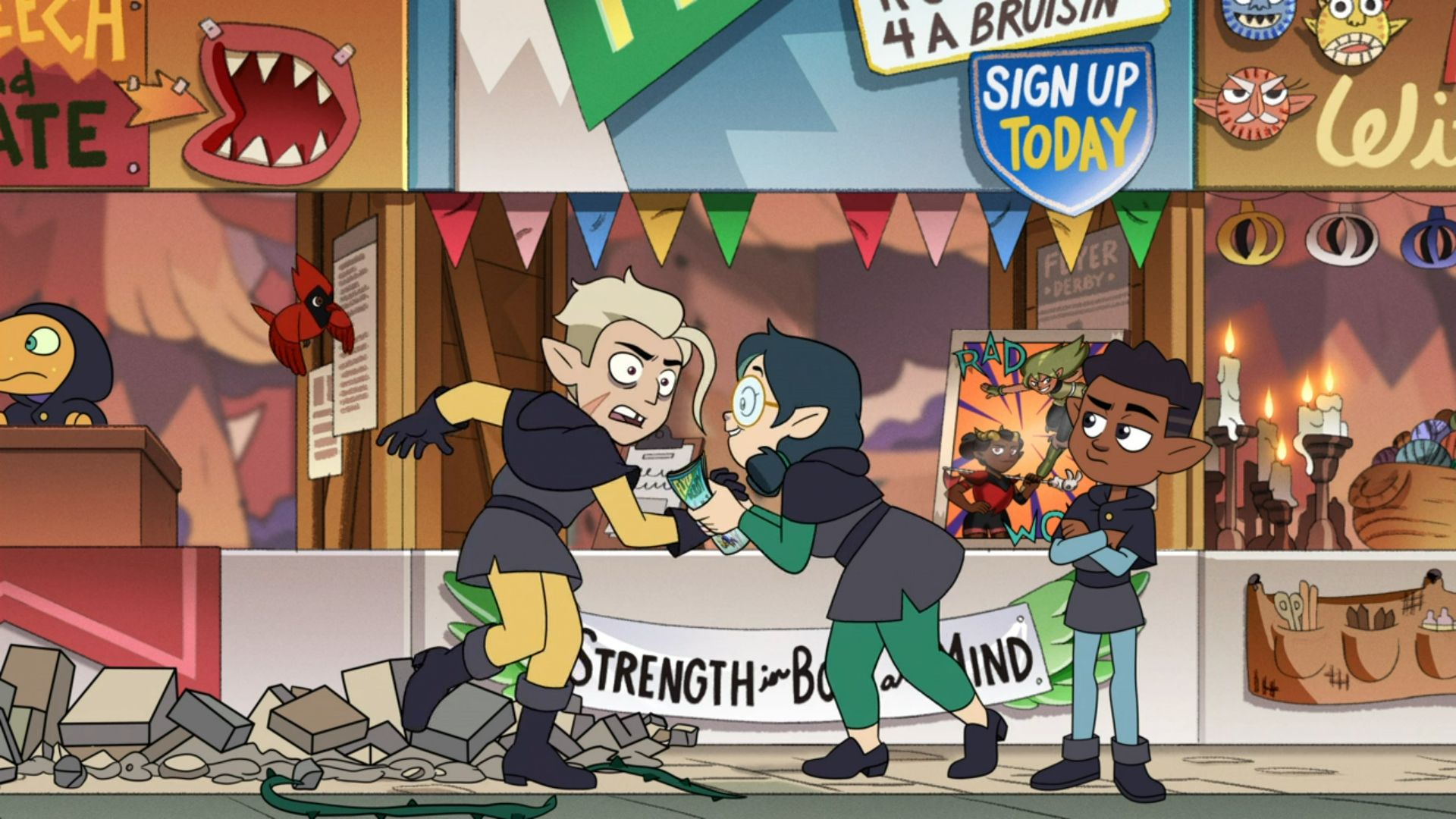“Hunter has such an underdog story,” voice actor Zeno Robinson tells me. “You can tell that throughout his journey he has a really good heart, and it’s in the right place. He is just going about certain things wrong. It’s very tragic because we’re all like, ‘No please! We know you can be good, so just be good’ and then you add in the elements of trauma and people start to really see themselves [in Hunter] because of what they’ve suffered and gone through.”
The Golden Guard has become a firm favourite among fans since his debut in The Owl House. Robinson’s performance imbues the character with a conflicted morality which has him both seeking answers to his own fractured existence, while also realising that enemies turned friends like Luz Noceda, Willow Park, and Gus Porter have so much more to offer him. Yet accepting this change takes time, and is often a terrifying thing to comprehend.
Robinson continues: “He has a lot of quiet moments in the second season where he isn’t The Golden Guard. He spares a palisman whom he bonds with and learns that people can just be good. His heart at the end of the day is what people really attach themselves to, and Hunter has a really complex, layered, and nuanced identity that people really like about him.”
While Robinson is used to active fandoms thanks to roles in shows like My Hero Academia, Pokemon, and the upcoming Digimon reboot, the rampant enthusiasm behind The Owl House still took him by surprise. Even years later, he hasn’t seen anything like it.
“I remember when Dana announced it,” he says. “Usually when I announce something it gets a cool response and people congratulate you. When I was first cast in My Hero Academia it was the most attention I’d ever gotten on Twitter ever. My follower account shot up so much on that day alone, and I’d never seen anything like it - until Dana announced me as Hunter.”
Robinson compares the fandom of The Owl House to serialised anime, and how members of the community are emotionally attached to characters in ways that aren’t common for western animation. This was always the intention, with the show consistently leaning into its anime influences and desire to deliver a deeper narrative.
“It wasn’t obvious at first, but I remember doing some of Hunter’s scenes like the chase with Luz or the Eclipse Lake fight and, because I’d done a lot of anime, I’d perform an effort and be like, ‘Ooo, sorry was that too anime for you?’ and then Dana would just lean in and be like, ‘No no no. More anime.’ She’s an anime fan. Got it. I know exactly how to play this now and exactly where to go and what to do. So then I’d just turn the anime dial up and all the anime influences in The Owl House became evident. Not only is it serialised that way, which is why Dana prioritises that kind of storytelling, but it’s also pretty inspired by it too.”
But where exactly did Hunter’s voice come from? I can hear smatterings of it in Robinson’s regular tone as we talk, although it isn’t until we broach on its origins that The Golden Guard begins slipping out. “It was just a picture,” Robinson recalls. “They gave me a picture in the audition file, and I didn’t know he had a gap tooth at that time either, so he just looked like a really serious kinda guy. Like a serious kid with the tired and serious expression that he has.”
Robinson slips into the voice as he explains it to me, and the circumstances in which he first came up with the delivery and threw his audition at Disney is equally wholesome. “I had like 15 minutes because I was recording the audition between sessions, so I had to hurry up, or I was going to be late. I just looked at it and picked something, and it just came out of me the way it did.” Hunter seemed like an “edgy kid with an attitude” so Robinson leaned into that. To his disbelief, it landed him the job. Such time constraints brought the best out of him, to think on his feet and deliver a take on the character that nobody else was able to.
The Owl House is set to conclude its trio of extended specials this weekend, and with it the story Dana Terrace and company set out to tell with its world and characters. A cancelation has resulted in it arriving in a uniquely truncated form, but main players like Hunter still have plenty of room to shine. Robinson remembers his bigger moments fondly, and how reaching so deep into his character’s emotional core proved to be a difficult yet worthwhile challenge.
“I love drama. I love that in storytelling. So I was hoping for a big crying scene,” Robinson explains. “I hoped he’d get to confront things, because with Hunter it’s like trauma, trauma, trauma, having a freakout, and then suppress, suppress, suppress, because I have a world to save, I have this to accomplish, I have to do this. I don’t have time to sit here and process this. And when he did have time he didn’t even process anything because he was too busy trying to do the right thing and make up for his actions. He never even thought about what he needed. For Luz to say that he’s family, and he belongs, which is so powerful to those who’ve felt like they’ve never belonged anywhere. A lot of what Hunter goes through I can relate to. I’ve had those moments of feeling like I don’t belong, feeling alone, or feeling so bad that I can’t even focus on this thing that has happened to me because I have this and that to do.”
Hunter breaking down and needing to be comforted by Luz was a rejection of masculinity and a moment of raw emotion fans immediately clung onto, and how even in his weakest and most vulnerable instances, they knew their bad but sad boy was going to be okay.
“The idea of hearing someone telling you that I see you, you’re one of us, and you belong is a powerful thing, and it was a joy being able to relish and play into that. Those big emotional moments are part of why I act, so getting to do them was like a treat. With the crying scene, the take I did initially I wasn’t sure about and had to ask, ‘is this really what we’re doing?’ so did a take and Dana asked, ‘Can we break him more?’ We 100 percent can break him more!”
We also took a bit of time to pour one out for Flapjack as I asked how Robinson responded to his death, and to also learn that his passing was permanent: “So the episode ended, but I was thinking, it’s Disney, so he died, but he’s not dead. He’s obviously gonna come back at the end. And then he didn’t.” Not only did this catch the cast by surprise, it also seemed to be a statement of intent from Dana Terrace and how hard the final season was going to go.
“I was like, ‘Can we do this? Are we allowed to do this?’ and I remember thinking that Dana does not care. She’s like this is it, this is the end, I’m pulling out all the stops, I’m not holding back anything or pulling any punches. Which I loved because I kept thinking that she would not be able to get away with that. As a Disney show, we can’t get away with killing Flapjack.”
They did, and Flapjack’s death is now cemented as one of The Owl House’s most tragic yet memorable moments. Robinson tells me that he kept waiting for his palisman to come back as part of the next script, or that Terrace was pulling a fast one and the cute little bird was waiting in the wings for a sudden comeback. “It’s like when you watch a ‘90s movie about a dog who dies at the end and you spend the entire time going ‘Oh my god I hope it doesn’t die at the end’ like Marley & Me! That’s what Flapjack felt like, we were killing the dog.”
Speaking of things being killed, The Owl House was cancelled long before its time, with so many stories and character arcs left on the cutting room floor. This had a huge effect on all those involved, especially the actors who had started to put so much of themselves into the roles they were entrusted with. “It sucks,” Robinson states. “There were so many stories to be told that the second season was building towards, so to have so much of that cut or cut short is so unfortunate. One day I do want to sit after it’s aired to talk about the rumblings I have heard about what things were going to develop into or what things were looking to be until everything kinda got railroaded. I see the response. Every week it trends [on Twitter] so as a viewer you’re like, do you guys not like money or success?”
The New York Comic Con panel was the big turning point, with Disney seeming to realise it had made a mistake culling a show with this much of a following. “It was absolutely electric. It was insane. They had to turn away hundreds of people,” Robinson says. “I’ve done lots of panels before at NYCC and that was, without a doubt, the biggest panel I’ve ever been on with the biggest audience reception and response. I think that was when they were like, ‘We might have messed up.’ This is just me, but I do think there were producers and higher reps at Disney who wanted The Owl House to stick around, but there were other, more powerful people who I guess didn’t for some reason?”
We spend a few minutes going back and forth about behind-the-scenes drama and the sad hand the show was dealt, but it can never take away from how much of an impact The Owl House has had on people. When I pose this question to Robinson, his answer is endearing and heartfelt: “Hunter is one of those characters I really see myself in. I really see myself as someone who does wear masks and spent a lot of his time serving things that weren’t good for him. That feeling of being alone. In his arc now he’s embracing his weirdness, he’s busy reading comic books, he’s cosplaying. He even says something that resonated with me and that’s - “I may not be who I want to be, but I like who I am right now” - and that implies that he didn’t like himself for a long time and that he’s working through that identity crisis.”
And yes, to satiate the shippers, I asked about the romantic relationship between Hunter and Willow which has slowly been rearing its head these past few months. “It came as a surprise to me that people shipped them in general. Why Willow and Hunter? Maybe it’s a strong girl and nerdy guy kinda thing, but I love it because they seem like such an unlikely pair. They’re great friends, advanced friendships and all that. But I love that fans love them and ship them, and I love messing with them as well.”

